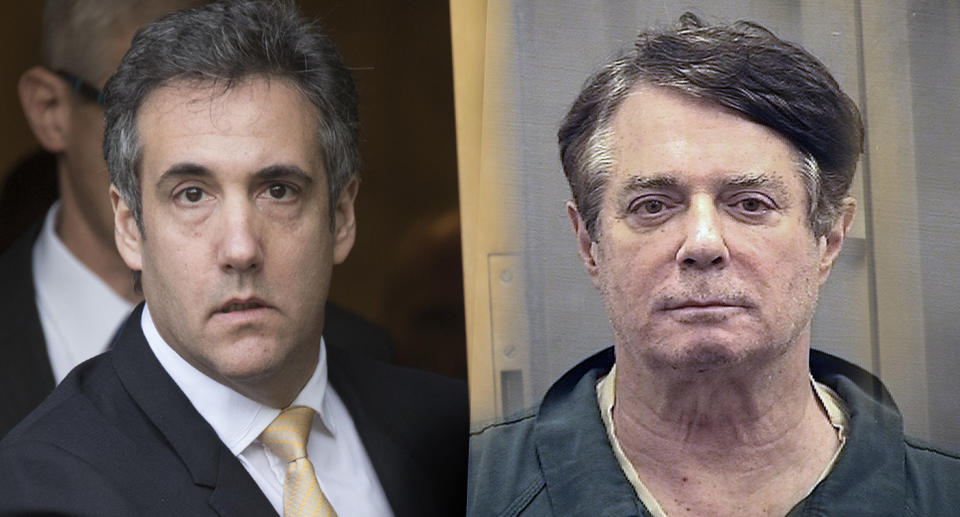How the Trump scandals will affect financial markets
The tumultuous Trump presidency has been good for markets, so far. But investors now have some heady new possibilities to consider.
The recent convictions of Michael Cohen, Trump’s former lawyer, and Paul Manafort, his 2016 campaign manager, have exposed Trump to more political peril than he has faced in his 18 months in office. Both men know details of Trump’s business and political dealings that could fuel the investigation of special counsel Robert Mueller. And Trump may now be vulnerable to charges of campaign-finance violations—a felony—for his hush-money payouts to women he had affairs with. Trump opponents will hammer him for corruption, while supporters may begin to waver.
Markets are unperturbed by the mushrooming controversy, with no abrupt moves in stocks or other securities following the dramatic twin convictions. The road could get bumpier, though. While there’s no immediate development that directly affects markets, Trump’s political power will probably diminish, while opposition Democrats will grow more emboldened. That could ultimately change Washington’s legislative and regulatory agenda in ways that investors might want to start considering now.
Republicans who support Trump—which is to say, most of them—seem to be standing behind the president, for now. But the Trump scandals probably raise the odds that Democrats will win control of the House of Representatives in November. Democrats still face long odds of taking the Senate, but even if they do, a Democrat-controlled Congress still won’t be able to pass legislation Trump opposes. “Trump’s veto is still good,” says Greg Valliere of Horizon Investments. “And there would not be the votes for overturning a Trump veto.”

Democrats have talked about repealing recent GOP-backed legislation, such as the Trump tax cuts. But with Trump or any Republican in the White House, it won’t happen. Democrats would, however, be able to block any Republican legislation with control of just one congressional chamber. So the odds of a Democratic takeover of the House—probably around 60% or even 70%–portend the likelihood of near-total legislative gridlock.
[See why markets shouldn’t worry about “President Pence“]
Trump impeachment scenarios are another prospect complicating the outlook. If Dems control the House, it would be easy to impeach Trump, since it only requires a majority vote. But conviction in the Senate would require 67 votes, and there’s no chance Democrats will control that many seats. So conviction would require some Republicans to abandon Trump and vote against him.
That’s not out of the question, but it would probably take even more tangible evidence of crimes committed by Trump, a tanking economy, or some other calamity. It’s worth keeping in mind that Richard Nixon only resigned in 1974 after losing the support of fellow Republicans in the Senate, who increasingly saw his presidency as a lost cause.
An impeachment fight would roil Washington and turn an already poisonous political environment even more toxic. Short of a national emergency, Republicans and Democrats would be able to cooperate on practically nothing, including more infrastructure spending, where there’s overlapping interest among parties. That wouldn’t necessarily be bad for markets, however, since the corporate sector doesn’t really want or need much beyond the tax cuts that are already lifting corporate profits.
If Trump were to resign before his term ends, it would be a momentous political development. But Vice President Mike Pence, who would succeed him, backs many of the pro-business policies Trump does, with a bonus: He would probably roll back Trump’s trade wars and make peace with trade partners such as Europe and Canada, while perhaps changing tactics in Trump’s showdown with China. Markets would cheer a trade war de-escalation.
The real worry for markets may come with the 2020 presidential election. A scandal-plagued Trump would probably be a weaker candidate than he was in 2016. If Trump doesn’t run, Pence probably would, and his bland persona might fail to motivate much of the Trump base.
Possible Democratic candidates such as Bernie Sanders, Elizabeth Warren and Cory Booker generally support measures that aren’t so great for the business sector, such as a rollback of tax cuts for businesses and the wealthy, an expansion of government health care programs and tougher environmental and financial regulation. So investors may start to worry about a Democratic administration that could depress stock values. But that’s more than two years off, in a chaotic environment where the world can change in a single day.
Confidential tip line: rickjnewman@yahoo.com. Click here to get Rick’s stories by email.
Read more:
Rick Newman is the author of four books, including “Rebounders: How Winners Pivot from Setback to Success.” Follow him on Twitter: @rickjnewman
Follow Yahoo Finance on Facebook, Twitter, Instagram, and LinkedIn

 Yahoo Finance
Yahoo Finance 
